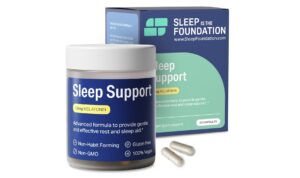Melatonin Benefits: How This Natural and Synthetic Hormone Impacts Sleep
Melatonin is often referred to as “the sleep hormone,” because of its role in helping people become tired and ready for sleep . The pineal gland in the brain begins producing melatonin a few hours before bedtime, in response to the eyes experiencing dim light or darkness .
“Melatonin is nature’s timekeeper, signaling to our brain and bodies when it’s time to wind down and prepare for sleep,” says Dr. Abhinav Singh, medical director of the Indiana Sleep Center in Greenwood, Indiana, and a SleepFoundation.org medical-review panel member. “Its versatility in addressing various sleep disorders makes it a valuable tool in sleep medicine.”
People can also take melatonin in pill or other forms as an over-the-counter dietary supplement . The supplement melatonin hasn’t been officially approved by the US Food and Drug Administration (FDA) for any specific uses, but is thought to act similarly to melatonin produced by the body. In addition to impacting when a person feels sleepy, melatonin may have other benefits.
Why Do People Take Melatonin?
Many people take melatonin supplements in hopes of improving their sleep , whether on an occasional basis for temporary reasons like jet lag or to manage a more chronic sleep condition. In addition to potentially improving sleep, research has found that melatonin may be useful for other health-related purposes.
Benefits of Melatonin for Sleep
Melatonin supplements may help people fall asleep at specific times, which can be useful for those with insomnia, shift work disorder, jet lag, and circadian rhythm sleep-wake disorders. The use of melatonin supplements has also been studied in some other sleep disorders, with mixed results.
Insomnia
The American Academy of Sleep Medicine strongly recommends trying non-pharmacological treatments for insomnia first, such as cognitive behavioral therapy for insomnia. There is insufficient research on the side effects of taking melatonin long-term. However, compared with other medications, the American Academy of Family Physicians (AAFP) considers melatonin supplements the preferred treatment for insomnia .
Insomnia can include difficulty falling asleep or staying asleep. Melatonin has been found to be helpful for those with difficulty falling asleep, but it hasn’t been found to help those who have trouble staying asleep .
When people take melatonin for insomnia, they generally take between 1 and 5 mg. However, melatonin doses below 1 mg may also be effective. Experts generally advise taking melatonin a few hours before the time you want to go to bed.
Shift Work Disorder
For the sleep-wake schedule to work properly, a person needs to go to bed and wake up at consistent times every day. Ideally, sleep should occur at night, when darkness triggers the brain to produce melatonin. For shift workers with changing schedules or those who work during the night, the brain might have trouble producing melatonin at times when they need to sleep.
Experts suggest that taking melatonin before intended sleep periods may help, whether used alone or in conjunction with other strategies like light therapy.
“While melatonin shows promise for conditions like jet lag and shift work disorder,” Dr. Singh notes, “it’s crucial to remember that it’s not a one-size-fits-all solution. The timing and dosage of melatonin supplementation can significantly impact its effectiveness.”
Jet Lag
With jet lag, a person’s sleep schedule is thrown off because they have rapidly crossed multiple time zones and their internal clock is not yet aligned with their new environment. Many people wonder about taking melatonin for jet lag relief. Indeed, taking melatonin supplements may help a person adjust more quickly and reduce jet lag symptoms. Taking melatonin at night helps a person go to bed earlier and taking it in the morning may help them stay up later.
Traveling east usually causes more severe jet lag than traveling west, because most people find it easier to fall asleep later rather than try to wake up earlier. As a result, timed melatonin doses may not be needed for westward travel unless a person crosses over 12 time zones. For people traveling east across up to seven time zones, experts generally recommend taking .5 to 3 mg supplements around bedtime in the new time zone after arrival.
Circadian Rhythm Sleep-Wake Disorders
When people have intrinsic circadian rhythm sleep-wake disorders, their bodies naturally become misaligned with the 24-hour day in their environment. As a result, a regular sleep schedule may be difficult to manage. Melatonin may help with some of these disorders.
- Non-24-hour sleep-wake rhythm disorder (N24SWD): Most common among people with blindness, this disorder involves a sleep pattern that is commonly longer or, in some instances, shorter than 24 hours because it isn’t being set by light exposure . Melatonin supplementation is the top treatment for this disorder. The commonly recommended dose is .5 mg taken one hour before bedtime.
- Delayed sleep-wake phase disorder (DSWPD): In this disorder, a person’s natural inclination is to fall asleep and wake up much later than what fits their environment. Lifestyle changes and a set bedtime are often suggested first, but if they do not help, a doctor may recommend trying melatonin supplements . Recommended doses are 3 to 5 mg taken 1.5 or more hours before bedtime.
- Advanced sleep-wake phase disorder (ASWPD): People who have this disorder go to sleep and wake up earlier than what fits their environment. Experts generally recommend not taking melatonin for this disorder, because it could make a person tired during the day .
REM Sleep Behavior Disorder
Whereas most people have paralyzed arm and leg muscles during rapid eye movement (REM) sleep, people with REM sleep behavior disorder physically enact their dreams. This can be dangerous for themselves or for a bed partner . Based on studies showing that melatonin helped reduce these episodes, the American Academy of Sleep Medicine recommends that doctors consider prescribing melatonin to treat REM sleep behavior disorder in certain cases.
However, more research is needed and melatonin is not currently the preferred treatment for any of these disorders or a substitute for prescribed treatments. Talk with your doctor or sleep specialist before considering melatonin supplements for any of these sleep disorders.
Other Benefits of Melatonin
Melatonin has antioxidant and anti-inflammatory properties, and melatonin supplements may help with the symptoms of health-related issues beyond sleep disorders. Research on melatonin for other disorders is still in an exploratory stage, so talk to your doctor before beginning melatonin supplements for any of these purposes.
- Procedural anxiety or phobia: Up to 80% of people who undergo surgery experience anxiety, and taking melatonin before surgery may help . People may take 3 to 10 mg of melatonin to reduce anxiety 90 minutes prior to surgery, but should discuss this with their doctor or surgeon in advance rather than do it on their own.
- Seasonal affective disorder (SAD): Seasonal affective disorder is a mood disorder that impacts a person seasonally, whether in the winter or summer . Some experts believe that melatonin levels play a role in the disorder. Studies have looked into whether or not melatonin supplementation can help , but more research is needed to make a conclusion.
- Alzheimer’s disease: Alzheimer’s disease has been linked to poor sleep and disrupted melatonin rhythms . For these reasons, researchers have studied if melatonin supplements may help prevent or treat Alzheimer’s disease. Currently, more research is needed to determine if melatonin may help.
- Gastroesophageal reflux disease (GERD): Although melatonin is primarily produced in the brain, it can also be made by the intestinal tract . Melatonin made in the intestines has a protective effect against digestive problems. Some research also suggests that taking melatonin supplements may reduce acid reflux in people with GERD.
- Migraine and other headaches: Limited research suggests melatonin may help with headaches, such as migraine and cluster headaches . More research is needed to confirm these early findings.
- Attention-deficit hyperactivity disorder (ADHD) and autism: Both ADHD and autism are neurodevelopmental disorders that have been found to involve trouble sleeping and abnormal melatonin patterns . Some studies suggest melatonin supplements, together with sleep hygiene habits, may help improve sleep among children with these disorders.
- Other illnesses and health concerns: In recent years, researchers have begun studying how melatonin supplements affect a wide range of illnesses. While more research is needed, preliminary studies suggest melatonin may have benefits for autoimmune disorders, certain pregnancy complications, blood pressure, cholesterol levels, cancer, and eye health .

Still have questions? Ask our community!
Join our Sleep Care Community — a trusted hub of sleep health professionals, product specialists, and people just like you. Whether you need expert sleep advice for your insomnia or you’re searching for the perfect mattress, we’ve got you covered. Get personalized guidance from the experts who know sleep best.
Medical Disclaimer: The content on this page should not be taken as medical advice or used as a recommendation for any specific treatment or medication. Always consult your doctor before taking a new medication or changing your current treatment.
References
21 Sources
-
Goldstein, C. (2024, September 10). Jet lag. UpToDate
https://www.uptodate.com/contents/jet-lag -
Abbott, S. (2024, February 5). Non-24-hour sleep-wake rhythm disorder. UpToDate
https://www.uptodate.com/contents/non-24-hour-sleep-wake-rhythm-disorder -
The National Center for Complementary and Integrative Health. (2024, May). Melatonin: What You Need To Know.
https://www.nccih.nih.gov/health/melatonin-what-you-need-to-know -
MedGen (n.d.). Melatonin. MedGen Bookshelf ID: NBK534823. U.S. National Library of Medicine, National Center for Biotechnology Information.
https://www.ncbi.nlm.nih.gov/books/NBK534823/ -
Li, J., Somers, V.K., Xu, H., Lopez-Jimenez, F., Covassin, N. Trends in Use of Melatonin Supplements Among US Adults, 1999-2018. JAMA. 2022, Feb. 1; 327 (5): 483-485
https://pubmed.ncbi.nlm.nih.gov/35103775/ -
Matheson, E., Hainer, B.L. Insomnia: Pharmacologic Therapy. Am Fam Physician. 2017, July 1; 96(1): 29-35
https://pubmed.ncbi.nlm.nih.gov/28671376/ -
Neubauer, D. (2024, November 12). Pharmacotherapy for insomnia in adults. UpToDate
https://www.uptodate.com/contents/pharmacotherapy-for-insomnia-in-adults -
Goldstein, C. (2023, December 27). Overview of circadian rhythm sleep-wake disorders. UpToDate.
https://www.uptodate.com/contents/overview-of-circadian-rhythm-sleep-wake-disorders -
Auger, R.R. (2023, October 17). Delayed sleep-wake phase disorder. UpToDate.
https://www.uptodate.com/contents/delayed-sleep-wake-phase-disorder -
Sharkey, K. (2023, October 16). Advanced sleep-wake phase disorder. UpToDate.
https://www.uptodate.com/contents/advanced-sleep-wake-phase-disorder -
Howell, M., Avidan, A.Y., et. al. Management of REM sleep behavior disorder: an American Academy of Sleep Medicine clinical practice guideline. J Clin Sleep Med. 2023, April 1; 19(4): 759-768
https://pubmed.ncbi.nlm.nih.gov/36515157/ -
Choy, Y. (2024, February 23). Acute procedural anxiety and specific phobia of clinical procedures in adults: Treatment overview. UpToDate.
https://www.uptodate.com/contents/acute-procedural-anxiety-and-specific-phobia-of-clinical-procedures-in-adults-treatment-overview -
National Institute of Mental Health (2023). Seasonal Affective Disorder.
https://www.nimh.nih.gov/health/publications/seasonal-affective-disorder -
Nussbaumer-Streit, B., Greenblatt, A., et. al. Melatonin and agomelatine for preventing seasonal affective disorder. Cochrane Database Syst Rev. 2019, June 17; 6(6): CD01127
https://pubmed.ncbi.nlm.nih.gov/31206585/ -
Melatonin. Medscape.
https://reference.medscape.com/drug/n-acetyl-5-methoxytryptamine-pineal-hormone-melatonin-melatonin-344545 -
Zhang, Z., Xue, P., et. al. Melatonin: A potential nighttime guardian against Alzheimer’s. Mol Psychiatry. 2024, Aug 11; doi: 10.038/s41380-024-02691-6.
https://pubmed.ncbi.nlm.nih.gov/39128995/ -
Chang, S.B., Young, J.Y., Gwang, H.B. Melatonin for the treatment of gastroesophageal reflux disease; protocol for a systematic review and meta-analysis. Medicine (Baltimore). 2019, Jan; 98(4): e14241.
https://pubmed.ncbi.nlm.nih.gov/30681611/ -
Schulz, R., Ahuja, N., Slavin, J. Effectiveness of Nutritional Ingredients on Upper Gastrointestinal Conditions and Symptoms: A Narrative Review. Nutrients. 2022, Feb 5; 14(3): 672
https://pubmed.ncbi.nlm.nih.gov/35277031/ -
Gelfand, A., Goadsby, P. The Role of Melatonin in the Treatment of Primary Headache Disorders. Headache. 2016, Sep; 56(8): 1257-66
https://pubmed.ncbi.nlm.nih.gov/27316772/ -
Rzepka-Migut, B., Paprocka, J. Efficacy and Safety of Melatonin Treatment in Children with Autism Spectrum Disorder and Attention-Deficit/Hyperactivity Disorder-A Review of the Literature. Brain Sci. 2020, April 7; 10(4): 219
https://pubmed.ncbi.nlm.nih.gov/32272607/ -
Minich, D., Henning, M., et. al. Is Melatonin the “Next Vitamin D”?: A Review of Emerging Science, Clinical Uses, Safety, and Dietary Supplements. Nutrients. 2022, Sep 22; 14(19): 3934
https://pubmed.ncbi.nlm.nih.gov/36235587/







